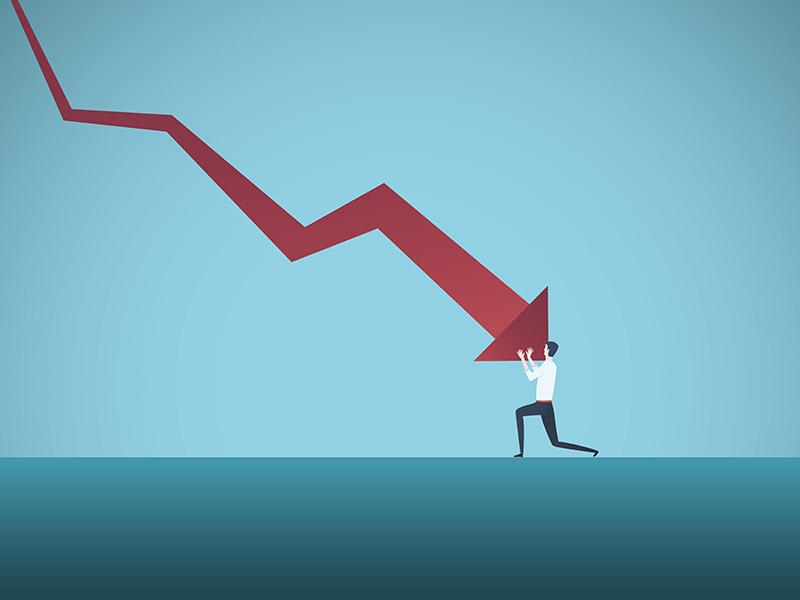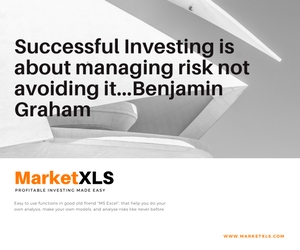Many stock market analysts have identified ominous signs that could indicate a looming economic recession. How would an economic downturn effect your biotech portfolio? Here is what a biotech investor needs to know about recessions…
Recessions are no fun. Anyone old enough can remember those queasy days in 2008 and 2009, waking up at dawn to see how bad stocks were plunging in Asia, aiming to gauge how much punishment your portfolio was going to take just after the opening bell. No one likes Wall Streeters; but when hedge fund managers are jumping out of their Manhattan penthouses, it doesn’t put any investor at ease.
Many well established analysts have pointed out disturbing signs that could indicate trouble ahead. The yield curve, a somewhat wonky comparative measure of interest rates, has been inverted for some time (this has been a reliable indicator of coming recession during the last fifty years). Other pundits have pointed out that stock market valuation indicators, such as Profits to Earning ratio, are extremely elevated, which is often a precursor to a crash. Many have pointed out the utter absurdity of the Unicorn phenomena, with massively unprofitable mega startups incinerating billions in cash with no obvious path to profitability.
Whatever sign of impending doom you may be looking for, the most important fact is the following: just as in nature, “what goes up, must come down.” Recessions are a natural part of the economic cycle. Boom and bust have been part of the human experience for thousands of years. Everyone feels like a stock market genius when the market only goes up year after year. But the real investing pros know how to take advantage of bad conditions to make a killing.
Good luck is always great to have, but good knowledge is a more reliable way for you to be prepared. The following are four factors to consider so that your biotech portfolio will be ready for the next recession, whenever it may come…
1. THE STRONG GET STRONGER
As I have pointed out frequently in my writing, a lot of today’s most exciting biotech companies really aren’t companies at all. They are a bundle of scientific assets under development; the closer to commercialization these assets get, the higher the stock market value. However, in reality, 90% of public biotechs will never mature to the point of directly selling products into the medical market. Many high flyers have no revenue at all, or just embryonic revenue that doesn’t get them anywhere close to positive cash flow. This means that they depend almost exclusively on “external” funding; IPOs, “private equity placements,” loans, and, depending on how far along they are, licensing agreements.

Just like any boob can feel like a stock market genius ten years into the world’s greatest bull market, it’s been extraordinarily easy for well connected scientists to raise huge sums of funding. As crazy as it sounds, a scientist with the right connections can raise twenty or thirty million dollars fairly easily. Think about it; as long as the bull market continues to rage, many early stage investors have made fortunes from tiny biotech companies with no revenue; that’s the magic of a market that never goes down. So, a lot of marginal biotech entities can just keep going back to the well for what seems like a never ending supply of cash to burn.
But great parties leave huge hangovers when the cold light of dawn inevitably arrives. In the post 2009 world, a whole generation of young venture capitalists and scientist/entrepreneurs have never had to contend with an environment of constantly falling stock prices. Put yourself in the shoes of a venture capitalist or investment banker. If y I arrange $50 million in funding for your profitless company, and your stock price triples, then I will always have another $50 million ready on command. But if I arrange $50 million in funding, and your stock goes from $10 to $3, am I going to throw good money after bad? Note, this scenario has nothing to do at all with the scientific value of the research and development, or even the skill of executives involved. A rising tide lifts all boats; a sudden change in tide leaves a lot of great technology stranded and desperately looking for rescue.
This is where you can leverage your investing skills to create Alpha. Some biotechs are much better funded than others. Those that have strong cash positions when the funding crunch hits will be able to buy promising technologies for a song. Many fledgling companies will go bankrupt, but that doesn’t necessarily mean that their most promising technologies will go into the dustbin. Rather it means that they may well wind up in your portfolio ,if you have chosen stocks that are strong enough to weather the storm.
So what should you be looking for? In short, staying power. Staying power consists of four elements
A) Cash on hand. You can determine this by comparing cash and cash equivalents on hand vrs the company’s burn rate. For example, if your biotech has $200 million in cash on hand, and the cash flow sheet reveals that they burn about $50 million in a year of operations, they are well funded and would likely survive a recession. If they have $200 million on hand, but they typically burn $200 million a year, then they are very likely to run into severe problems if the stock market tanks.
B) Borrowing capacity. Does the company have much debt on its books? You can find this out by perusing the balance sheet. This consideration isn’t much different than in your own personal life. If you are gainfully employed, and have kept a clean credit record, you would be prepared if you were laid off and faced a cash crunch. You could always put expenses on the credit card for a while until you find another job. However, if you are laid off, and you already have maxed out your credit cards beforehand, you may need to find a trashcan to live in. Same with a biotech. Companies with promising tech and low debt can usually borrow money in a pinch, but if they are already up to their eyeballs in debt, bankruptcy looms.
C) Friends with deep pockets. Another consideration is; who are your fellow shareholders? You can determine this by simply typing in a stock ticker into Google, and the words “ownership.” Most online brokerages also have a tab that lists major stockholders in a public corporation. Many of the more established, sturdy biotechs have shareholders with deep pockets, such as Big Pharma mega corporations, or even individual tycoons. If a company’s technology is trending in the right direction, but it’s finances are not, shareholders with big resources may step in to save the day. Whether you own .00001% of a corporation, or 20%, bankruptcy doesn’t look good on someone’s investment record. If your biotech doesn’t have any big name investors, then they could well drown and no one would notice.
D) Agreements in place. While many promising biotechs are not cash flow positive, they may have reached a point in the commercialization process where they have licensing or partnership agreements in place. For example, they may have a Big Pharma partner that will make payments based on certain clinical milestones. In a pinch these agreements can be accelerated or renegotiated to keep a company afloat during a stock market storm.
When you go shopping for biotech investments, a good rule of thumb is, “If this company couldn’t access fresh funding for two years, would they be bankrupt?” In the jungle of biotech investing, only the strong survive.

2. LOW INTEREST RATES COULD BE VERY GOOD FOR BIOTECH
Typically during episodes of economic duress, we see interest rates fall dramatically. This has already begun to happen in varying degrees around the world, and could accelerate in the United States if the stock market crashed.
For some biotech concerns, ultra cheap credit could be a bonanza. Typically, biotechs obtain growth capital by selling equity. You may have heard the terms “Round A” funding, or “Round B” funding, etc. These are young companies selling slices of themselves to obtain more and more capital, with the hope of growing the overall value of the company. But each round of equity funding can cause equity dilution. Let’s say that you are founding scientist at Biotech Corp X. You start out owning 25%. As you go through successive funding rounds, you own progressively less of the company that you founded. The mathematical logic goes like this; owning 5% of a company valued at $1Billion is much more lucrative than owning 25% of a company valued at $100 Million. So, with each successive funding round, including an Initial Public Offering, existing investors may agree to own less and less of the company, in hopes that the overall company grows exponentially.
This is a common practice, but it isn’t always necessarily the best practice. If your Biotech Company X could borrow money, instead of selling equity, then potentially the company could grow and grow, without any equity dilution at all. The problem is, most biotech companies are risky to say the least, so they would have to pay prohibitive interest rates to borrow. If we enter a 0% interest rate world, that whole dynamic could be flipped on its head. Borrowing at 1% could be seen as preferable to diluting equity stakes, especially if the stock market is constantly heading in the wrong direction.
But as I mentioned above, not everyone will be able to take advantage of this bonanza. Look for companies that already have strong balance sheets and a measurable track record of advancing technology. These are the most likely candidates to take advantage of favorable credit conditions when the opportunity arises.
3. PANIC IS GOOD
Some of the most valuable things you can learn by watching the Financial Media has nothing to do with actual analysis (which is often vapid) and more to do with understanding how the “in crowd” thinks. You will probably hear a lot of talk about “sectors.” Such as the “tech sector,” the “financial sector.” Because most consumers of Financial Media are really not that savvy, the pundits tend to whitewash huge swaths of the economic machine with broad terms that can be easily understood. This tends to fuel stock market euphoria and the inevitable panics that occur from time to time. If someone decides that the “biotech sector” is too risky, or “overbought” then hundreds of stocks crash all at once; many for no real reason at all. This is what we call a sale.
As the British would say, “keep calm, and carry on.” A lot of stocks will crash because they should. But know that a meaningful minority will remain solid; they are just temporarily caught up in the tempest of paranoia and fear that happens when a bull market abruptly dies. Look for companies that are well funded, have made tangible progress in R&D, and address a durable need in the medical market.
4. DEMAND ISN’T GOING ANYWHERE
Sadly, cancer doesn’t know the difference between good times, and bad. As demographics continue to age in the Western World, demand for medical services will continue to grow exponentially, no matter where the stock market is at the moment.
The technical definition of the word “recession” is a lack of demand in the economy. This is why recessions tend to be horrific for “discretionary” spending, i.e. luxury vacations, fancy cars, etc. These items are part of what economists call “elastic demand.” The demand for these goods and services can vary depending on how rich people feel at that moment in economic time. But many biotechs are hard at work creating technologies to address grave illness. Economists would call this, “inelastic demand.” In other words, if the stock market crashes, many people would avoid cruises or luxury steak houses, but most will still find a way to access oncology services. Even during the worst moments of 2009, people suffering from heart attacks still got treatment at the local hospital.

In times of extreme economic distress, we do see lower healthcare utilization. This is because many people have healthcare tied to their jobs; unemployment may cause a problem with access. Also, people have large deductibles these days. Someone with a $5,000 deductible could get hit with a hefty medical bill even if she does have insurance.
However, most Americans and Europeans still access services for critical health needs, cost be damned.
Look for biotechs that are truly striving to meet unmet needs in the healthcare market. In other words, look for tech that patients can’t live without. First, these are less likely to see a downtown during a recession because actual, life saving treatment is rarely denied. Second, the journey to novel technologies usually takes many years. Whoever does still have access to funding during a downtown is most likely to apply that funding to companies that have already made demonstrable progress. Real biotech pros understand that the need for health will never go away, therefore recessions are just opportunities in disguise.
Recessions have a lot to do with psychology, and psychology is really just the scientific study of feelings. Feeling prepared for the next downturn will help you tune out the noise from the panicked masses. Study the tips above, and you will be prepared to capitalize when opportunity knocks on your door…








Really good advice. Take it from someone who has been investing through several really big recessions. Don’t forget the biggest rule of caution: “Never invest money you need to spend within 5 years.” You can always wait out a recession if you have put aside money to pay your college student’s tuition.